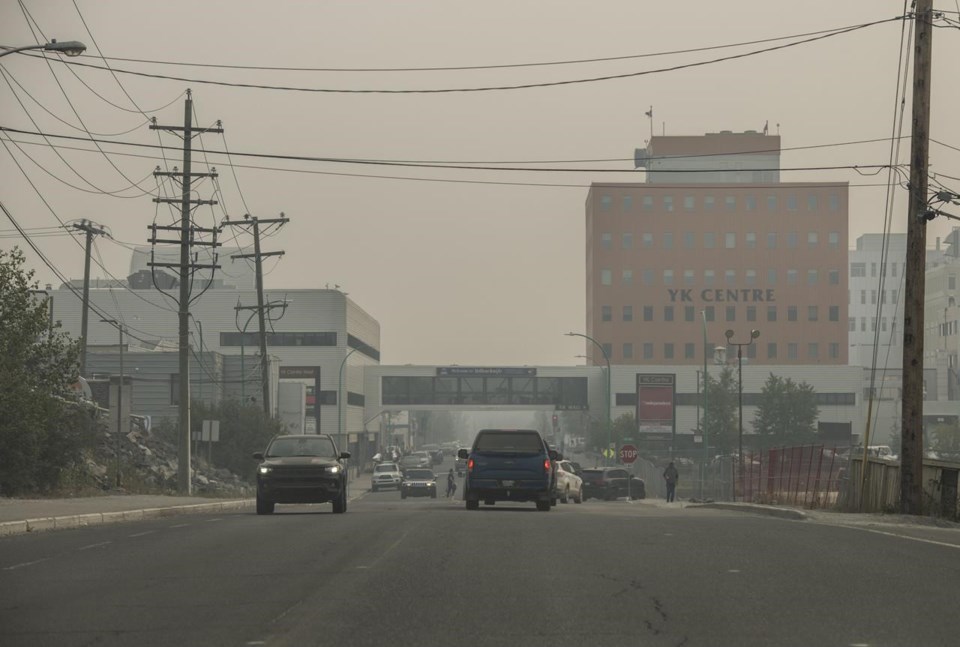YELLOWKNIFE — Residents of Yellowknife and a nearby First Nation who have been evacuated for weeks due to wildfires are being told to start planning now for their return home, beginning Wednesday.
Officials with the Northwest Territories and Yellowknife governments told a news conference that people who will be driving home are responsible for their own food and accommodation on their way back, and that they should prepare to be self-reliant for 72 hours upon their return.
They said that means bringing along prescriptions, non-perishable food and cash.
Residents who left on evacuation flights are encouraged to pre-register for return flights home, either online through the territory's public safety web page or by phone lines which are already open.
Officials said the pre-registration will enable them to plan how many flights home will be needed, as well as where to dispatch the planes.
The date when people will start being allowed back, announced late Friday afternoon, is contingent on the fire situation and Highway 1 to Yellowknife remaining open.
"We're feeling very good about that fire that was threatening Yellowknife," N.W.T. wildfire information officer Mike Westwick told the news conference Saturday, noting wind gusts of up to 55 km/h tested the fire breaks only a short while before the re-entry date was announced.
"That eastern perimeter held. That was a really important test," Westwick noted.
The evacuation order for Yellowknife and the nearby First Nation communities of Ndilo and Dettah was issued on Aug. 16.
Only essential workers who have been contacted are being allowed back now, and everyone else is being told to stay where they are until the evacuation lifts on Wednesday.
"Please do not drive towards the Alberta-NWT border until Wednesday, Sept. 6. There are no supports available in northern Alberta for evacuees considering moving north to wait for the (evacuation) order to be lifted," said Shane Thompson, minister of municipal and community affairs.
Jeffrey Edison, acting assistant deputy infrastructure minister, said work is underway to get the route home for evacuees ready. He said that includes porta-potties, traffic controllers for the Deh Cho Bridge across the Mackenzie River and tow trucks with gas for people who run out.
"This is not free gas to get you back, but emergency gas," he said, noting travellers should keep an eye on the online highways map to stay up-to-date on what routes might be closed.
"Please be patient, please be kind. Your safe return is a priority."
Edison said the territory is also working with the Alberta government to ensure enough fuel is available at the limited fuel stops along the route.
For residents who will be arriving home by plane, Yellowknife City Manager Sheila Bassi-Kellet said buses and taxi vouchers are being organized to take people from the airport to their homes or cars.
Mayor Rebecca Alty said it will be a while before things are back to normal.
"We can't wait a whole month and get everything up and running and be perfect, so that's where we're really making sure residents are clear where you're coming home that you're prepared," Alty said.
The Northwest Territories Health and Social Services Authority issued a public notice on Friday, advising Yellowknife residents to expect limited services upon re-entry as the system ramps up.
Health Minister Julie Green said Stanton Territorial Hospital will have basic, life-sustaining services like emergency and some surgical services upon the lifting of the evacuation order. Mental health and wellness teams will work to expand their services for those affected by the trauma of the evacuation, she said.
People from the communities of Hay River, Fort Smith, Kakisa, K'atlodeeche First Nation and Enterprise remain displaced.
"Our teams are still working very hard to fight the fire outside your communities and our priority is to get you home as soon as it's safe," Thompson said, adding that people from those communities shouldn't head to Yellowknife, because supports wouldn't be there for them.
"Please continue to be patient and kind with one another."
This report by The Canadian Press was first published Sept. 2, 2023.
The Canadian Press



